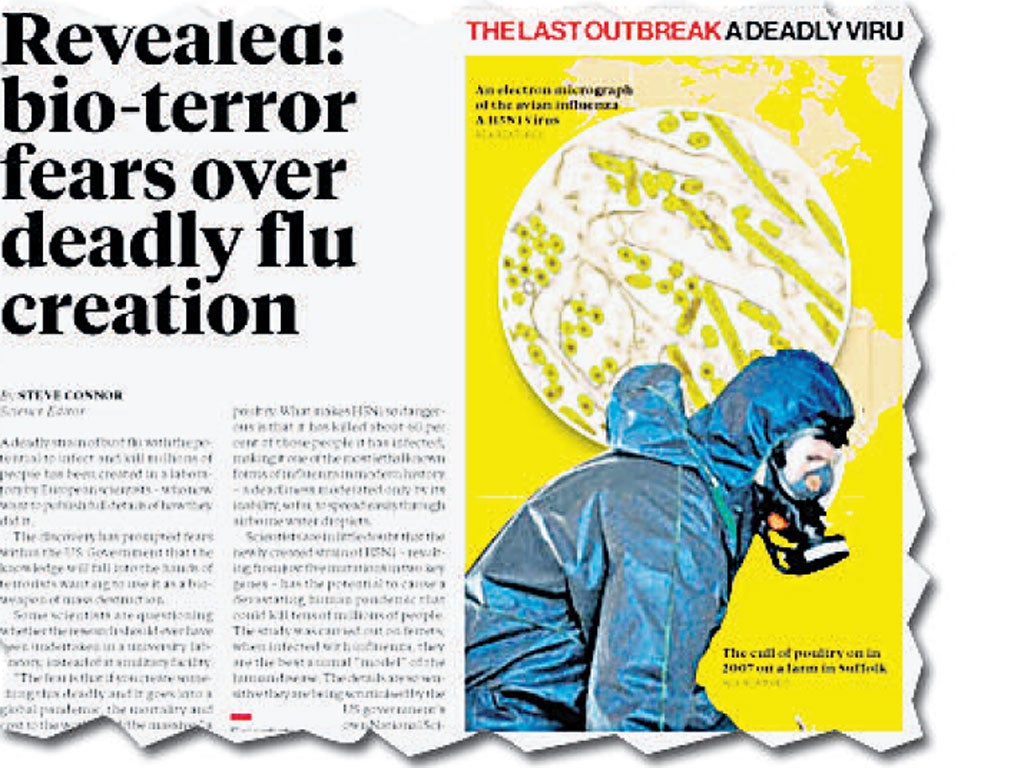Scientists to feel US government breathing down their necks
Chill winds of Washington's scrutiny set to blow through laboratories after deadly flu scare

Your support helps us to tell the story
From reproductive rights to climate change to Big Tech, The Independent is on the ground when the story is developing. Whether it's investigating the financials of Elon Musk's pro-Trump PAC or producing our latest documentary, 'The A Word', which shines a light on the American women fighting for reproductive rights, we know how important it is to parse out the facts from the messaging.
At such a critical moment in US history, we need reporters on the ground. Your donation allows us to keep sending journalists to speak to both sides of the story.
The Independent is trusted by Americans across the entire political spectrum. And unlike many other quality news outlets, we choose not to lock Americans out of our reporting and analysis with paywalls. We believe quality journalism should be available to everyone, paid for by those who can afford it.
Your support makes all the difference.Scientists studying potentially dangerous infectious agents will be subjected to far greater scrutiny from the start of their research following the controversy over virologists who surprised bioterrorism experts by creating a highly infectious strain of birdflu virus.
The US Government has drawn up a list of 15 dangerous toxins and pathogens, from influenza to bubonic plague, it will scrutinise from the beginning of a research proposal rather than waiting until scientists submit their final results for publication.
The move comes as flu experts meet in London this week to discuss H5N1 birdflu and how to handle cases of "dual use" research that has a valid non-military purpose but could be misused either by terrorists or rogue states intent on developing biowarfare agents.
The issue came to a head last December when the US Government's National Science Advisory Board for Biosecurity recommended two research papers documenting the airborne transmission of H5N1 birdflu should be redacted prior to publication over fears key details could be used by bioterrorists to start a global pandemic.
Both manuscripts, one by Ron Fouchier of Erasmus Medical Centre in Rotterdam and the other by Yoshihiro Kawaoka of the University of Wisconsin, were subsequently revised. Last Friday the board decided it would now be safe to publish the findings after it had reappraised the risks and benefits of full publication.
However, board members were dismayed they first heard of the work by Fouchier and Kawaoka after the scientists submitted it for publication in the journals Science and Nature. "The US Government has now issued a new policy on the regulation and monitoring of this type of research experiments. This suggests this type of work will not fly under the radar any longer," said Paul Keim, the board's chairman. "High-level scrutiny will be applied to research early in the funding process, not just at the end when researchers want to publish."
Under the new policy, scientists will be subject to detailed scrutiny if they work or propose to work on a range of potentially dangerous diseases or toxins, such as botulism, and animal diseases such as foot-and-mouth. The policy states 15 infectious agents were singled out as they "pose the greatest risk of deliberate misuse with most significant potential for mass casualties or devastating effects to the economy, critical infrastructure, or public confidence".
Work on the avian influenza is also included because the H5N1 birdflu virus is deadly on the relatively rare occasions it has jumped the "species barrier" from bird into humans. Of the 598 confirmed cases of birdflu in humans, 352 have proved fatal – a mortality rate of nearly 60 per cent.
Dr Fouchier and Dr Kawaoka demonstrated using different techniques that it was theoretically possible to make H5N1 far more infectious by mutating it into a form that could be transmitted through the air between laboratory ferrets, the classic animal "model" of human influenza.
Join our commenting forum
Join thought-provoking conversations, follow other Independent readers and see their replies
Comments